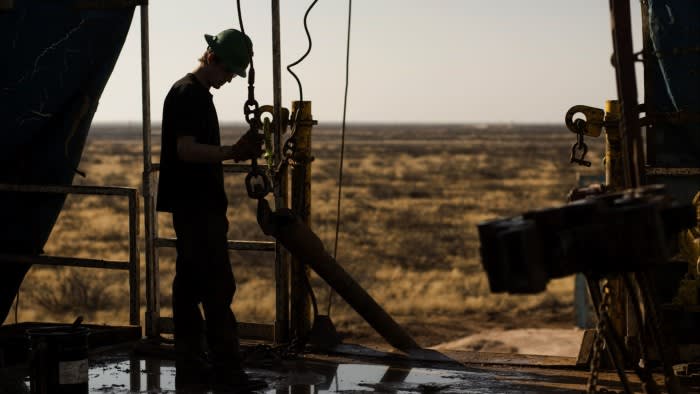Dealmaking in the U.S. oil and gas sector has soared to nearly $200 billion over the past year as the biggest producers battle to swallow up rivals in a race for scale that has reshaped the national energy landscape.
But as the nation’s best drilling territory is captured, companies are casting a wider net, looking beyond the most sought-after oil fields for acquisitions that will boost their ability to pump hydrocarbons in coming years.
“We’re in the middle of a wave of consolidation and I don’t think it’s over yet,” said Jon Hughes, managing director of Petrie Partners, a small investment bank that advised on the $60 billion sale of Pioneer Natural Resources to ExxonMobil.
“We went from approximately 65 to 41 publicly traded oil and gas companies in the U.S. in less than five years.”
Companies including Exxon, Chevron and Occidental Petroleum have announced $194 billion in deals in the US shale region since last July, according to consultancy Rystad Energy. This is almost triple the amount in the previous twelve month period. The latest news came this week when ConocoPhillips announced a $22.5 billion takeover of Marathon Oil, after talks between the companies were reported by the Financial Times.
According to Rystad, there are still at least $62 billion in assets on the market.
Companies like Permian Resources, Matador Resources, Chord Energy and Civitas Resources are in the crosshairs of bigger players, says Michael Alfaro of Gallo Partners, a hedge fund focused on industrials and energy. He also pointed to private companies including Double Eagle and Mewbourne Oil as attractive prospects.
Houston-based EOG, valued at $70 billion, and Oklahoma-based Devon Energy, valued at $30 billion, are the largest publicly traded U.S. players to hit the recent wave so far. Devon risks becoming a target for other players if it fails to grow bigger, analysts said. The company had held talks with Marathon but was defeated by Conoco, people familiar with the deal said.
EOG and Devon did not respond to requests for comment on their plans.

The dealmaking burst has entered a new phase. With much of the prime acreage covered in the fertile Permian Basin of Texas and New Mexico – the engine room of the nation’s oil industry – companies are looking further afield. The consolidation has left nearly two-thirds of the shale oil in the field in the hands of just six companies, Rystad estimates.
Conoco’s deal for Marathon marked a strategic shift in the mergers and acquisitions wave. Marathon owns some of the Permian acreage, but its assets are also spread across lesser-known basins such as Texas’s Eagle Ford, North Dakota’s Bakken and Oklahoma’s Scoop Stack. The deal came after Conoco lost to rival Diamondback Energy in its bid to buy Endeavor Energy Resources, one of the Permian’s prized targets.
“With limited remaining opportunities in the Permian, increased competition could have prompted ConocoPhillips to look elsewhere for sizable options,” said Palash Ravi, senior analyst at Rystad. “It is very likely that US shale consolidation will move beyond the Permian.”
The recent wave of deals started with Exxon’s $60 billion bid for Pioneer, the largest oil producer in Texas, last October. That was quickly followed by Chevron, Exxon’s biggest rival, announcing a controversial $53 billion deal for Hess.
Others soon followed as the largest oil companies competed to acquire smaller rivals: Occidental Petroleum beat Diamondback with a $12 billion deal for CrownRock. Diamondback later knocked out Conoco with its $26 billion deal for Endeavor. Conoco’s $22 billion acquisition of Marathon came Wednesday after weeks of battles with Devon Energy.
Tensions have come to the fore, with Exxon and Chevron sparring over the latter’s acquisition of Hess. Exxon says it has the right of first refusal on any sale of Hess’ stake in a lucrative project off the coast of Guyana and has filed an arbitration case that could derail the biggest deal in Chevron history.
The dealmaking binge has also caught the attention of antitrust regulators. The Federal Trade Commission has not yet tried to block a deal, but has launched investigations into many of the largest acquisitions.
Led by Lina Khan, chair of the FTC, six of eight announced oil and gas deals with price tags exceeding $5 billion have received a second request for information from the regulator, according to Petrie Partners. That is an increase compared to one in 27 over a period of almost twenty years earlier.
Of the investigations launched, the regulator has approved one deal: Exxon’s $60 billion acquisition of Pioneer. But its approval was conditional on Scott Sheffield, the former CEO of Pioneer, being barred from joining Exxon’s board on the grounds that he had conspired with OPEC to restrict oil supplies.
Sheffield, who called the allegations “wild and unbelievable,” said the FTC’s antagonistic stance — and its ability to look for past communications — could make executives think twice about making deals.
“I am very concerned that attacking past statements like these will have a chilling effect on the ability and willingness of business leaders to express their views publicly,” he told the FT.
The wave of dealmaking has transformed the US oil and gas landscape from one of thousands of small-scale operators to one dominated by a few major players.
According to consultancy Wood Mackenzie, Conoco’s latest deal will see output larger than supermajor TotalEnergies and comparable to BP. Conoco, Exxon and Chevron will together account for 25 percent of the remaining US shale oil reserves, Rystad calculates.
While many of the biggest deals have already closed, industry executives say much more consolidation is on the way.
“The horse is out of the barn on M&A and we expect the arms race for scale to continue,” said Mark Viviano, portfolio manager at private equity group Kimmeridge.
